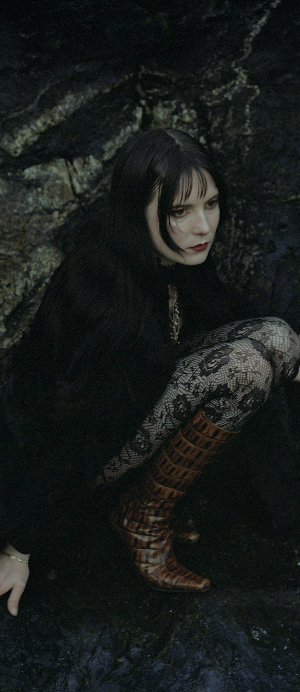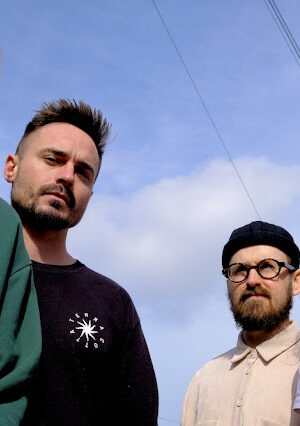TMR TALKS TO...
SHE DREW THE GUN
In this interview feature, we get to know the most radicalist up and coming stars on the planet. This time we speak with Louisa Roach of The Wirral band She Drew The Gun. There are few musicians who so aptly and eloquently capture the sorry state of the world through their songwriting. Louisa Roach is one of these rare voices who isn’t willing to let the capitalist, corporate powers that be get away with degrading our human rights and explain away global atrocities. The music throughout Roach’s album Revolution of Mind is full of fervent energy, frustration, and also hope. There’s a hope in humanity that makes the record a soundtrack to your political march, your petition signing, your social media activism, and so on. We recently selected album track ‘Something For The Pain’ as a List Pick, a bold statement that turns the listener’s attention to the refugee crisis, however with her own futuristic dystopian twist. In our interview we delve further into that track, as well as more notable songs like ‘Arm Yourself’ and ‘Resister’. We also discuss music culture in the North West, love songs, being an outsider and more. *** TMR: Revolution of Mind is an epic record, encapsulating so much of our modern day-to-day existence. Where did writing this album start for you? Thank you! Well, the first thing that was written and recorded, way before the other tracks was, ‘Revolution of Mind’. So I guess you could say that is the heart of the album, everything else was built around that, it was a poem I had which turned into a song. It’s probably the most lyrically intense part of the album and starts with me trying to make sense of terrorist attacks, which pans out to look at the military-industrial complex, corporate greed, religious fundamentalism and asking the question how we can do anything about it? For me, art is a form of revolutionary practice that we need to build communities that are resistant to the deadly rhetoric of war and oppression. TMR: In ‘Arm Yourself’, you call to the listeners to weaponise their minds with knowledge. Why is this message important for you to get across? I guess it’s that same thing really, it’s a little call out for community. I think it’s important to resist the passive flow of information that we are receiving all the time, but at the same time the song is about celebrating people coming together and losing themselves. It’s my reminder to myself to enjoy the moment and get lost in the night sometimes but to always come back to the mission. TMR: You’ve been quoted as saying that you’re drawn to music that goes beyond simple love songs. That being said, have you found yourself penning a romantic track? Oh yeah, I have written lots of love songs, they were the first thing I wrote, some of them will never be made public, and some of them are. I have nothing against love songs at all and I hope I’ll write many more, I just like it when an artist speaks to me about bigger things sometimes. TMR: There’s an awareness to the album, one that looks beyond a single human experience. Do you think that’s something lacking in popular music at the moment? In the majority of mainstream music it’s lacking, maybe, yes, but it’s still there. Hip Hop is pretty much the biggest genre in music now and there is plenty of interesting stuff going on there, J. Cole, Joyner Lucas, Kendrick Lamar all play with characters, different forms of narrative and question accepted truths in their music. There’s all kinds of great stuff in many genres if you look beyond the surface. TMR: The record stitches several genres and styles of music together, how did you arrive at this eclecticism? I enjoy a lot of different styles of music and I’ve always liked an eclectic album, I fell in love with The Beatles’ The White Album as a young teenager and I suppose that set the framework in my mind of what an album could be. I like a patchwork. TMR: One song that leaves the air around the speakers buzzing with energy is ‘Resister’, a lyrically rich anthem for underdogs and black sheep, do you count yourself in this group? Yes, my life has had its share of “outsiderness” and I’ve always enjoyed being the underdog - it would be strange if it didn't come out in my music. I think, firstly, from growing up, rebelling against gender rules, being a tomboy, having one foot in the girls camp and one in the boys, but never really belonging to either, then realising you’re not straight and all the shit it takes to explore your sexuality when everyone else seems to be. Then trying to fit in to the world, but being politicised realising that you are not down with the 9 to 5, the status quo is not for you, but you don't know what the fuck is, so you get lost, and down and out, and get out of your mind and need to heal before you can move on and find a space to work in this crazy old piss factory. But everyone has their own battles, sometimes we forget that other people feel like they are on the outside too. TMR: Do you have a favourite song on the album? I have a soft spot for ‘Dopamine’. TMR: You’re from and currently based in The Wirral, a part of the UK rich in musical history, but what are some of the current problems facing the music culture there? I’ve never really thought of The Wirral as having its own music culture apart from maybe the days of listening to Happy Hardcore in the park! Town has always been 20 mins away which is closer than anything that might have been happening on the other side of the Wirral, so for me there’s not that much of a distinction between Liverpool and Wirral music scene because it’s all the same thing. Saying that, there are a couple of interesting things starting to happen, ‘Skeleton Coast’ has been a big success and the Bloom building in Birkenhead is important. As a whole, I think in Liverpool we’re still very much missing some of the venues we’ve lost in recent years, and as always, we’re crying out for affordable places to create and work together, which, when they are there, constantly seem to be closed down or under threat. TMR: Obviously there’s a positive side too, as we’ve seen with the surge in exciting bands and artists from Liverpool and the surrounding areas in the last few years. Who are some of your favourite local acts? Total respect for all my fellow artists making it work especially in a competitive ecosystem such as Liverpool, we’re overflowing with boss stuff right now. I couldn’t even list them all I’ll just give you a few of my favourite M’s for now. Marvin Powell, The Mysterines, Mamatung and the undiscovered one that is Philly Moore. TMR: It’s been an exciting time for She Drew The Gun following the album release, what else do you have planned for the year ahead? Lots of Festivals, then we’ve just announced our biggest headline tour yet in October/November, so it’s all about taking the album out around the country and reaching as many ears as possible. Revolution of Mind is out now. -Hannah Thacker
Listen



